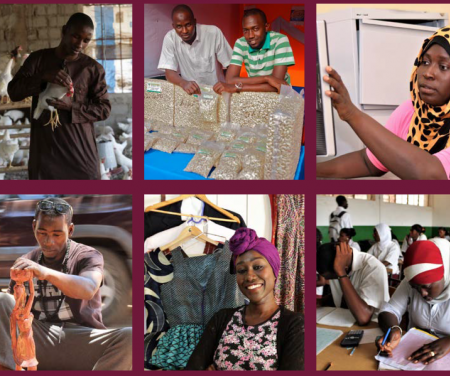The Youth and Trade Roadmap
The Youth and Trade Roadmap provides a blueprint that aims to tackle the root causes of irregular migration through increased job opportunities and income prospects for youth. In order to achieve this, the roadmap prioritizes those sectors that have the highest potential to generate decent jobs, but that are also appealing to today’s youth aspirations. The roadmap provides a vision for the country underpinned by concrete actions at both the national and the sector level, encapsulated in a series of three sector-specific strategies. These plans have been elaborated through a highly inclusive and participatory process involving a broad range of public, private and youth stakeholders.
Strategic Youth and Trade Development Roadmap of The Gambia 2018 - 2022 (SYTDR)
The main document, the Strategic Youth and Trade Roadmap (SYTDR), lays down the overarching rationale and strategic framework for the complete Youth and Trade Roadmap.
Sector Specific Roadmap: Nuts and Agroprocessing
In The Gambia, agriculture remains one of the best responses to the youth employment challenge and poverty as it has the capacity to employ nearly half of the working population and remains the leading employer of Gambian youth.
The nuts and agro-processing roadmap focuses on fostering diversification and empowering youth through value addition so that they can take advantage of available trade opportunities.
Sector Specific Roadmap: Tourism
The richness of the natural and cultural assets found in the Gambian countryside can provide greater economics benefits beyond the coast. Tourism has a catalytic role in accelerating growth and employment opportunities to improve the welfare of the population and as such offers youth with prospects for selfemployment that are less accessible in other sectors.
The tourism roadmap focuses on the diversification of products, sustainable tourism and services to create opportunities for youth entrepreneurship and employment across the various segments of the value chain and regions of the country.
Sector Specific Roadmap: Information and Communications Technology (ICT)
Innovation hubs are being established across Africa and the impact on the economy is already being realized. Youth who have the digital skills will have the opportunity to explore opportunities in the growing digital industries and develop ICT-enabled services in The Gambia and sub-region.
The ICT Roadmap thus focuses on managing sector diversification and building a relevant palette of skills nationally. Proper regulations need to accompany the digitalization of public services.
Sector Specific Roadmap: Creative Industries
Creative industries have a great development prospect in The Gambia based on its rich cultural heritage and interest of youth, and can help mobilizing the interests of the private and public actors to identify the economic opportunities found in developing creative industries that is capable of empowering all youth across the country.
The creative industries roadmap focuses on supporting innovation and strengthen productive capacitites of MSMEs in the creative industries, strengthening institutional support and sector development coordination of traditional and new creative sectors as well as increasing economic value and improve market access through branding, IP protection and promotion creation.
Sector Specific Roadmap: Technical and Vocational Education and Training (TVET)
Technical and vocational education and training ( TVET ) has seen renewed attention and interest from policymakers who have understood its potential in preparing young people for the job market. The newly established governance of the TVET system with the National TVET Committee and the new quality framework demonstrate that commitment. However, important bottlenecks need to be addressed to ensure homogenous quality of training delivery, its alignment to employers’ needs and accessibility to rural regions. A detailed diagnostic of the TVET and apprenticeship systems, as well as their supporting policy and regulatory frameworks, was carried out in the framework of this TVET Roadmap
